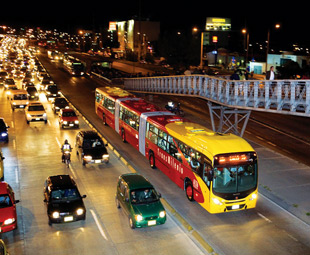Striving for comfort and efficiency

As we gear up for 2010, FRANK BEETON offers a brief overview of developments in the global bus market.
Recent orders received by Volvo Buses have included a contract to supply 300 chassis to Israel. The bulk of this shipment will consist of 235 B7RLE and B7R units powered by Volvo’s new 7 l bus engine, and will be consigned to Israeli body-builder Merkavim for one single customer.
In South America, Grupo Ruas of Sao Paulo, Brazil, has ordered 100 Volvo 9SALF bi-articulated bus trains, each with a passenger capacity of 196. This 26.5 m model has its engine located on the left between the first two axles, allowing kerb-height entry and egress on the opposite side. The bodywork for these units will be provided by Caio-Induscar of Brazil.
Bus Rapid Transit consortium Transmilenio of Bogota, Colombia, has ordered 84 articulated units, bringing to 200 the total number of Volvo buses supplied to this system during 2009. Volvo has replaced the 12 l engine previously used in its 9700 and 9700 coach models with a new 13 l D13C unit, which is offered in 420 hp (313 kW) and 460 hp (345 kW) versions. The new engine is claimed to be some 80 kg lighter than the smaller displacement unit it replaces and will also be used in the B13R coach chassis.
Irisbus Iveco has signed an agreement with BAE Systems of the United Kingdom (UK) for the supply of hybrid drive-line components and control systems for city buses. Irisbus plans to develop a new range of 12 and 18 m series hybrid buses based on its Citelis range, using the Iveco Tector 6 EEV engine with automatic stop-start control, an electric drive motor doubling as a regenerative energy recovery system, and lithium-ion batteries. Irisbus has already produced 120 hybrid buses, along with several dozen battery and fuel cell-powered vehicles, as well as more than 600 trolley buses.
Belgian coach builder Van Hool has launched its new three-axle Astronef touring coach equipped with an ascending theatre floor that allows good visibility to passengers seated in front. The Astronef is available in lengths of 13.2 and 14.04 m, with passenger seating capacities of up to 63. The company has also introduced an additional 15 m version of its T919 Altano high-deck coach with sunken driver’s cockpit, extending the previous range of 13 m and 14 m versions.
Van Hool has been working hard on improving wheelchair access across its range. Recent innovations include an extended front overhang on its Astromega double-deck coach models, providing a five-passenger lower saloon area with drive-off wheelchair facilities.
In Europe, automatic transmission manufacturer Allison has launched an upgraded version of its Torqmatic fully-automatic transmission for the medium-duty bus and coach market. The new T375 version has been optimised for Euro 5 engines with outputs of 360 hp (270 kW) and 1 450 Nm, and is already claimed to be operating in more than 2 600 buses in other parts of the world.
Tata Motors Limited has purchased the remaining 79% shareholding in Spanish coach builder Hispano Carrocera SA, to take full ownership of the company. Immediate plans include initiatives to improve operational efficiency, and the development of new products. As part of India’s national bus renewal initiative, Tata will be supplying a further 5 000 buses to state and local transport operators during the next six months.
IC Bus – specialist passenger vehicle manufacturer in the Navistar family – recently announced an order to supply up to 900 new CE series front-engined school buses to the state of North Carolina, USA. These buses will be built at IC’s Tulsa plant in Oklahoma, where more than 73 000 units have been produced since 2001.
Turkish bus manufacturer BMC has introduced a Euro 5-compliant version of its Procity full low-floor city bus. This step-less, walk-through full-monocoque structure is 11.88 m in length, riding on a fully-independent air-suspended front axle with a ZF AV 132 portal drive axle at the rear. Power options include a choice of Cummins ISBe5 or ISLe5 engines, with ratings covering the spectrum from 285 to 320 hp (213 to 240 kW), both matched to a six-speed ZF automatic transmission. Passenger entry and egress is facilitated by three doors, a kneeling function and a folding ramp; the latter to accommodate wheelchair users and passengers with restricted mobility.
BMC has also introduced a new school bus model aimed at the southern European market. The Alyos is a 12 m, 59-71 seater powered by a Euro 5-compliant Cummins ISBe5 285 hp (213 kW) engine, driving through a ZF six-speed manual transmission. Features include two-plus-three seating on the 71-seat version, with wheelchair compatibility achieved through the removal of a one-piece four-seat module located opposite the middle doorway. Built-in fixings to secure the wheelchairs are also provided.
Published by
Focus on Transport
focusmagsa



